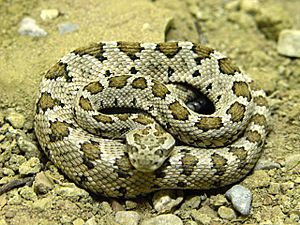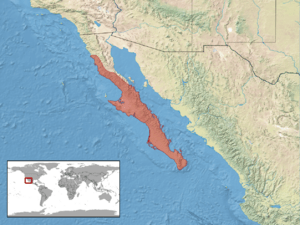Baja California rattlesnake facts for kids
Quick facts for kids Baja California Rattlesnake |
|
|---|---|
 |
|
| Scientific classification | |
| Kingdom: | |
| Phylum: | |
| Subphylum: | |
| Class: | |
| Order: | |
| Suborder: | |
| Family: | |
| Subfamily: | |
| Genus: | |
| Species: |
C. Enyo
|
 |
|
The Baja California Rattlesnake (Crotalus enyo), sometimes called the "Lower California Rattlesnake", is a type of venomous pit viper. This means it's a snake that can inject venom and has special heat-sensing pits on its face. There are two different kinds, or subspecies, of this snake found today.
Contents
About the Baja California Rattlesnake
What Does It Look Like?
Male Baja California Rattlesnakes are usually bigger than females. Some males can grow to be almost 90 centimeters (about 35 inches) long! Their heads are small and thin, but their eyes are quite large.
These snakes often have light brown or dark brown colors. You might also see some that are gray. They have special markings called blotches. These blotches can be black or light brown and usually have dark edges.
Where Do They Live?
The Baja California Rattlesnake makes its home in the deserts and pine-oak forests of northwestern Mexico. They are also found on several islands in the Gulf of California. These areas are often warm and dry, which is perfect for these snakes.
What Do They Eat?
Young Baja California Rattlesnakes have a different diet than adults. Baby snakes enjoy eating lizards and smaller centipedes.
As they grow older, their diet changes. Adult Baja California Rattlesnakes mostly eat rodents. They also hunt and eat large centipedes, especially those from a group called Scolopendra.
How Do They Have Babies?
Baja California Rattlesnakes usually mate in the spring season. After mating, the females give birth to their young. This usually happens in the summer or early fall.
A mother snake can give birth to anywhere from 2 to 7 baby snakes at one time. When they are born, these young snakes are quite small. They are usually about 20 to 22 centimeters (around 8 to 9 inches) long.
Types of Baja California Rattlesnakes
There are two known subspecies, or types, of the Baja California Rattlesnake:
- Cerralvo Island Rattlesnake, known scientifically as C. e. cerralvensis
- Rosario Rattlesnake, known scientifically as C. e. furvus
See also
 In Spanish: Cascabel de Baja California para niños
In Spanish: Cascabel de Baja California para niños

